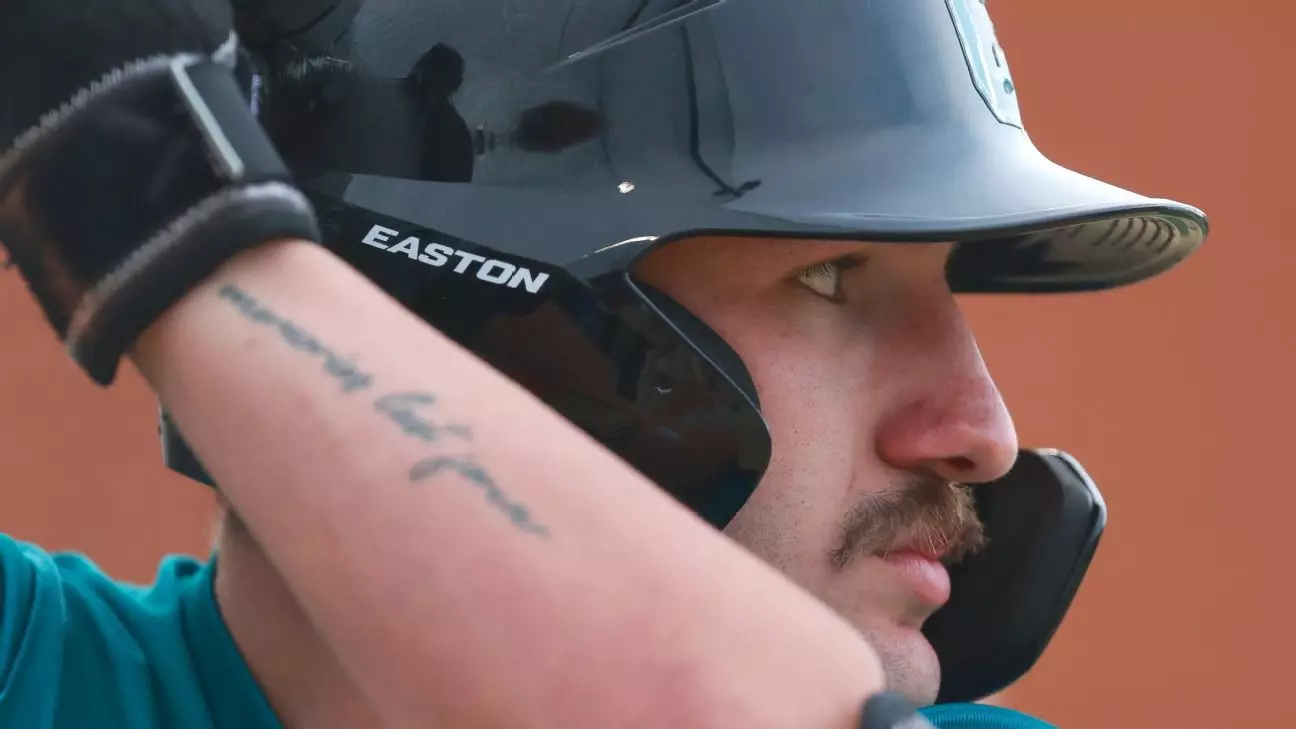In recent weeks, the baseball community has been buzzing with the allegations against Derek Bender, a former catcher for the Minnesota Twins’ minor league system. Accused of tipping off opposing hitters about incoming pitches, Bender finds himself under the microscope of Major League Baseball (MLB) as he navigates a tumultuous period in his career. He staunchly denies the accusations, stating unequivocally in a recent interview with The Athletic, “No, I never gave pitches away.” For Bender, these claims have marked a significant turning point, leading to a loss of professional status and an ongoing investigation that could result in severe consequences.
The controversy began on September 6 during a doubleheader against the Lakeland Flying Tigers, a part of the Detroit Tigers’ minor league network. Reports suggest that Bender provided information on pitch types to opposing batters, a move that directly contributed to the Mighty Mussels’ defeat, thus eliminating them from playoff contention. As the situation unfolded, it surfaced that Lakeland coaches alerted Bender’s team about the pitch tipping after the game, prompting significant concern from within the organization.
The ramifications of these allegations extend far beyond the baseball diamond. Bender has expressed the emotional toll of the situation, recounting experiences of social media bullying and even death threats. “I had to go dark for at least three days,” he explained, highlighting the overwhelming negativity directed toward him. In an age where public perception can universally sway opinions, Bender’s struggle illustrates how quickly reputations can be tarnished, particularly in the realm of professional sports, where camaraderie is a crucial component of team dynamics.
The psychological weight of the accusations has also adversely affected Bender’s relationships with teammates. He admitted to feeling ostracized, lamenting that friends questioned their relationship with him due to the public scrutiny. “It’s not like I’m getting accused of committing a crime,” he noted, underscoring the surreal nature of his current plight. The emotional distress, compounded by the uncertainty of his professional future, adds layers of complexity to his already challenging situation.
Seeking Redemption
Despite the turmoil, Bender remains determined to re-enter the world of professional baseball, suggesting that he would play in the upcoming season for the Brockton Rox in the independent Frontier League. His resilience is noteworthy; he views this as a crucial step in his journey to regain control over his life. In a candid moment, he acknowledged the struggle that has defined his months: “Because I’ve let this completely control me for months now.”
Bender’s path to redemption is further complicated by mixed signals regarding the Minnesota Twins organization. Reportedly, the organization offered to retain him if he would accept the allegations and issue an apology. This proposal placed Bender in a particularly difficult position, where safeguarding his integrity conflicted with maintaining his career in baseball. “The only thing I had left was my character at that point,” he claimed, signifying his unwillingness to compromise his values for the sake of a professional opportunity.
The Role of Representation
Bender’s circumstances have also revealed the nuances of player representation in sports. His agents at Octagon released him as a client, concerned about his media interactions amidst an active investigation. This development speaks to the responsibility that agents bear in guiding their clients through challenging situations, emphasizing the delicate balance between public relations and personal truth.
His decision to speak publicly, although contentious, signifies a shift in agency. “It’s about gaining control over my life,” he asserted, indicating a newfound resolve to assert his narrative amid external chaos. Bender’s journey serves as a reminder that individual actions can resonate deeply and alter the trajectory of a career, especially in the closely scrutinized world of professional sports.
As Bender prepares to transition to the independent league, he carries with him the weight of past decisions and the potential for a renewed identity as a player. Having signed with the Twins for $297,500 after a standout college career at Coastal Carolina, his trajectory took an unexpected turn with the onset of the investigation. While he struggled at the plate during his brief time with the Mighty Mussels, the larger challenge lies not in performance metrics but in overcoming the allegations that have become synonymous with his name.
This unfolding narrative reflects broader themes of integrity, redemption, and resilience. As Bender battles to reclaim his place in the sport, he embodies the complexities athletes face when challenged by the weight of public scrutiny, personal fidelity, and professional aspirations. How he navigates this turbulent chapter will ultimately define his legacy, in and out of the batter’s box.


Leave a Reply